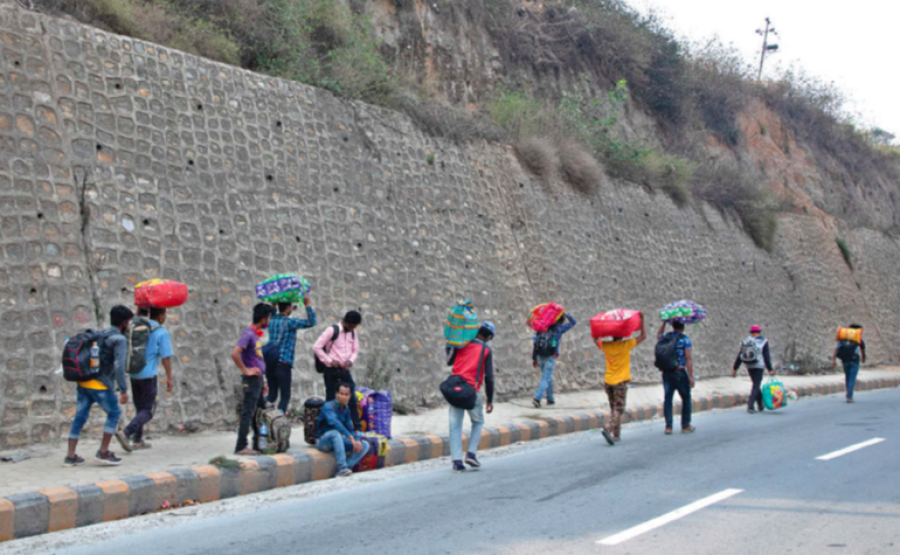National
Many in Kathmandu Valley can neither stay here nor go home
Without adequate rations and no savings, many are making a long walk back to their hometowns.
Anup Ojha
Sarita Tamang woke up at 2.30 am on Monday to ready her two children and all her belongings and leave for her village in Kavrepalanchok. She waited at her rented room in Dhobichaur for an acquaintance who had promised to pick her up and take her home.
“We had a plan to leave the Valley at night,” said 40-year-old Tamang. “Fifteen of us villagers were planning to leave Kathmandu that night.”
But the man never arrived, as he had been stopped by the police for violating the nationwide lockdown which has been in place since March 24. All non-essential public movement has been prohibited.
But people like Tamang are caught between a rock and a hard place—they can neither stay in Kathmandu nor leave for their hometowns.
Up until three weeks ago, Tamang was working at a restaurant in Mahaboudha but since the lockdon started, there has been no work and she is fast running out of savings.
“It’s been three weeks and we don’t have food to eat and can’t pay our rent,” she said.
Tamang received a relief package from Kathmandu Metropolitan City a week ago, but that ran out quickly and she doesn’t know when she will receive the next instalment.
“If the government can't feed us, why won't it send us home?” she said.
There have been numerous reports of people leaving the Kathmandu valley in droves to get back to their homes. Without public transportation, many are making journeys that are hundreds of kilometres long on foot. Images have appeared on social media of people carrying babies, clad only in slippers, and laden with possessions, all walking home.
Many say that they are walking home because the relief handed out by the government is inadequate or substandard and that they would rather be home, where they don’t have to pay exorbitant amounts in rent.
According to the Metropolitan Traffic Police Division, 465,972 people left before the government enforced the lockdown. But hundreds more are believed to have left on foot during the three weeks of lockdown.
“It took my cousin Aatma Tamang and me 12 hours to get home on foot from Kathmandu,” said 36-year-old Santa Tamang from Bakaiya Rural Municipality-6 in Makwanpur, who is a construction worker. “At least I am home. I do not have a problem with food and I am with my family now."
On April 9, the government decided to allow people to leave Kathmandu for their homes, but inexplicably withdrew the decision immediately. Since then, there has been no word from the government, despite widespread outrage on social media regarding the plight of these people. On Thursday, the Home Ministry instead decided to begin detaining people violating the lockdown.
According to the National Human Rights Commission, the government has failed to provide relief for people working in the unorganised sector, compelling them to embark on a risky journey home.
In a statement, the constitutional human rights watchdog said that the federal, provincial and local governments had a visible coordination problem in the distribution of relief and asked all levels of government to ensure that everyone receives the necessary essentials. The commission had monitored relief distribution in a number of districts together with the Nepal Bar Association, the Federation of Nepali Journalists and the Nepal NGO Federation.
Government officials, however, say that they are aware of the difficulties many are facing due to the lockdown and are working on addressing their issues.
“It’s not that the government has completely stopped discussions on ways to get people home,” Minister for Federal Affairs and General Administration Hridayesh Tripathi told the Post. “The government is doing its homework and preparing to rescue them.”
According to Agriculture Minister Ghanshyam Bhusal, a Friday meeting of the high-level coordination committee to combat Covid-19 will discuss the issue and hopefully take a concrete decision.
Binod Ghimire and Tika R Pradhan contributed reporting.




 18.12°C Kathmandu
18.12°C Kathmandu.jpg)














